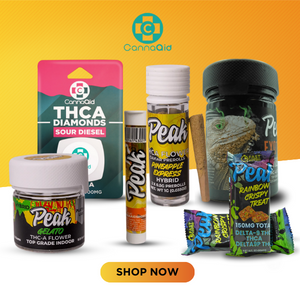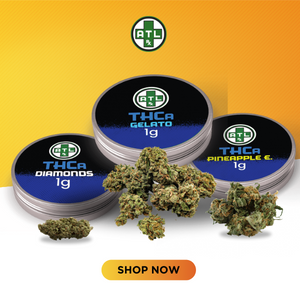THCA Products
Delta8Hub.com offers THCA hemp products available for purchase. Our selection includes premium flowers, vape options, and pre-rolls, all of which are 100% compliant with federal regulations. Our products are sourced from organic hemp flowers and are entirely non-synthetic. We take pride in delivering top-tier THCA products that feature full spectrums of beneficial cannabinoids and terpenes for an enhanced experience. If you are looking for a cheap THCA shop to buy THCA online then visit our store. we provide the product of THCA for sale at the best price so that people’s requirements for THCA can be fulfilled easily
What Is THCA?
THCA, which stands for tetrahydrocannabinolic acid, ranks as one of the primary cannabinoids present in the cannabis or hemp plant. What sets THCA apart is its non-psychotropic nature upon ingestion; instead, it requires a process known as decarboxylation, often referred to as “decarbing,” to activate. When THCA is decarboxylated, Delta-9-THC is formed, the compound which produces the usual marijuana “high.”
In the endocannabinoid system, Delta-9-THC interacts with CB1 and CB2 receptors, just like Delta-8-THC, Delta-10-THC, Delta 6a10a THC, and HHC.
What Is Hemp Derived THCA?
“Hemp-derived THCA” is a term that specifically designates THCA extracts and products sourced from hemp plants rich in THCA, distinct from THC-rich marijuana. This distinction holds paramount importance as it grants THCA manufacturers the ability to utilize high-THCA hemp plants, a practice that would be federally prohibited otherwise. However, for the everyday consumer, whether their THCA is hemp-derived or not may not significantly impact their experience. What holds greater significance is the quality of the THCA and the purity of the plant material from which it originates.
What Are The Benefits Of THCA Versus Other Cannabinoids?
The advantages of THCA compared to other cannabinoids include its unique non-psychoactive properties, potential anti-inflammatory effects, and its role as a precursor to THC, which may offer therapeutic benefits without the high. Additionally, THCA is more abundant in raw cannabis and can be consumed through juicing or dietary supplements. However, research on THCA is still in its early stages, and its full range of benefits and potential applications requires further investigation. Other cannabinoids like CBD and THC have their own distinct properties and advantages, making them valuable components of the cannabis plant’s diverse pharmacology.
Will THCA Show Up On A Drug Test?
In 37 states, cannabis is legal for medicinal purposes, while 21 states allow recreational use for those aged 21 and above. However, cannabis remains federally illegal, leading many companies and organizations to adhere to federal regulations regarding its consumption and possession. Consequently, even in states where cannabis is legal, it can pose problems, such as job rejections due to positive drug tests.
Failing a drug test in states without legal marijuana laws can also result in similar difficulties. The prospect of failing a drug test concerns people nationwide, whether for workplace requirements or other reasons. Having said that, the question arises: can THCA keep you from passing a drug test? Unfortunately, yes, THCA has the potential to lead to a failed drug test, despite being non-psychoactive.
Although Arete’s THCA meets federal guidelines with less than 0.3 percent Delta-9 THC, the decarboxylation process might alter these percentages, increasing the risk of a positive drug test. To stay safe, it’s advisable for individuals anticipating a drug test in the next 30 to 60 days to avoid THCA.
How Are THCA And THC Different?
Does the conversion of THCA into THC make these two cannabinoids nearly identical? While THC and THCA share some similarities, they also possess distinct qualities. Curious about the differences between THCA and THC then read below.
THCA refers to tetrahydrocannabinolic acid, a compound found in marijuana trichomes that is inactive. This inactive object has a purpose despite the fact that it is inactive.
THC, on the other hand, is the psychoactive form of tetrahydrocannabinolic acid and is typically absent in live cannabis. The brain’s CB1 receptors bind to THC, resulting in a pleasant “high.”
An additional carboxyl group in THCA prevents it from fitting into CB1 or CB2 receptors, making it non-psychoactive. It’s essentially unconverted THC.
To transform THCA into THC, decarboxylation is required. This process removes the extra carboxyl group, allowing it to bind with CB1 and CB2 receptors.
Decarboxylating THCA is straightforward and can be achieved through sunlight exposure, elevated room temperatures, or direct heat when smoking or vaping. Sunlight exposure is the lengthiest method, while direct heat during consumption is the most common.
What Kinds Of THCA Products Are Available In The Market?
To accommodate different preferences and consumption methods, THCA products can be found on the market in a variety of forms. Some of the common THCA products include:
THCA Crystals: These are pure crystalline forms of THCA, often used for dabbing or adding to other cannabis products to increase their THCA content.
THCA Tinctures: THCA tinctures are liquid extracts of the chemical. They are typically ingested sublingually (under the tongue) to promote fast absorption.
THCA Edibles: The active ingredient in THCA can be infused into various edible products like gummies, chocolates, or beverages, providing a long-lasting and discreet way to consume the substance.
THCA Capsules: As with edibles, THCA capsules can be administered precisely and are convenient to use.
THCA Topicals: These products are applied to the skin and may often used for localized relief from inflammation.
THCA Vape Cartridges: Vape cartridges containing THCA oil are inhaled using vaporizers, offering rapid onset effects.
THCA-infused Flower: Some cannabis strains are bred to contain higher levels of THCA, providing a more natural source of this cannabinoid for smoking or vaping.
THCA Isolate: THCA isolate is a highly purified form of THCA, typically used for creating custom cannabis products.
THCA-Infused Oils: THCA can be infused into carrier oils, making it versatile for various applications, including cooking.
THCA Concentrates: Concentrates like wax, shatter, or budder can be enriched with THCA, offering potent options for experienced users.
It’s important to choose THCA products that align with your desired effects, preferred method of consumption, and dosage requirements. THCA products should always be purchased from reputable sources, and if you have concerns or questions, consult your healthcare professional
Frequently Asked Questions
Is THCA legal?
The legal status of THCA, or tetrahydrocannabinolic acid, is subject to various regulations depending on its source and location. Moreover, a key element of hemp’s legality in the United States is the 2018 Farm Bill, which legalized hemp cultivation and sale.
Hemp-derived THCA, containing 0.3% or less delta-9 THC on a dry weight basis, is generally considered legal under federal law. This means that if THCA is extracted from hemp plants meeting these criteria, it can be legally produced, sold, and consumed in accordance with federal regulations. However, it’s important to note that individual state laws can further regulate or restrict THCA, so it’s essential to be aware of the specific regulations in your state.
On the other hand, THCA derived from marijuana plants, which contain higher levels of delta-9 THC, is subject to more stringent regulations and is often illegal in states that have not legalized recreational or medicinal marijuana.
To ensure compliance with the law, consumers and producers of THCA products should always verify the source and content of THCA, especially if they reside in a region with varying cannabis-related laws. Understanding local regulations is crucial to determine the legality of THCA in a specific jurisdiction.
What Are The Effects Of THCA?
Our understanding of tetrahydrocannabinolic acid, or THCA, is still developing, and we are still conducting research into its effects. In its raw, unheated form, THCA is generally considered non-psychoactive, unlike its well-known counterpart, THC (delta-9 tetrahydrocannabinol). THCA is the active ingredient in raw cannabis, not THC.
THCA only becomes psychoactive when exposed to heat, a process known as decarboxylation, which converts it into THC. In its unheated state, THCA is believed to offer potential therapeutic benefits without causing the characteristic “high” associated with THC.
A greater understanding of the potential benefits and risks associated with THCA will require more scientific studies. Some individuals prefer THCA for its purported medicinal properties, particularly when they want to avoid the intoxicating effects of THC.
As research into cannabinoids continues, our knowledge of THCA’s effects and therapeutic potential is likely to expand, providing a clearer understanding of how it can be used as part of a holistic approach to wellness and medical treatment. When using THCA for specific health concerns, always consult with your healthcare professional.
Does The 2018 Farm Bill Cover THCA Hemp?
The Agriculture Improvement Act of 2018 is one of the key laws that regulate hemp-derived products, particularly those containing THC (tetrahydrocannabinol). In contrast, the Farm Bill is largely concerned with delta-9 THC, cannabis’ psychoactive component, rather than its precursor, THCA (tetrahydrocannabinolic acid).
Defining hemp as cannabis with less than 0.3% delta-9 THC by dry weight is under the 2018 Farm Bill. If the THC threshold is met, hemp and hemp-derived products, including CBD (cannabidiol), are legal to cultivate, produce, and sell.
THCA, in its raw form, does not directly fall under the Farm Bill’s regulatory framework because it is not explicitly mentioned. However, the legality of THCA products can vary from state to state, depending on how individual state laws interpret and regulate non-psychoactive cannabinoids like THCA.
It’s important to note that while THCA itself may not be explicitly addressed in the Farm Bill, the final THC content after decarboxylation (conversion of THCA to THC) should still adhere to the 0.3% THC limit for hemp-derived products. Therefore, THCA products that undergo decarboxylation and exceed this THC threshold may be subject to different regulations.
Consult both federal and state laws and regulations about cannabis and its derivatives and seek legal advice as needed to ensure compliance.
What Is The Psychoactive Effect Of THCA?
A THC high is not produced by THCA itself; it does not produce a psychoactive effect. However, when exposed to heat or decarboxylated, THCA converts to delta-9 THC, which is psychoactive and binds to cannabinoid receptors in the brain, leading to altered perception and sensations.
What Is The Best Way To Use THCA?
Tetrahydrocannabinolic acid, or THCA, is typically regarded as non-psychoactive when it is raw. Cannabis’ well-known psychoactive compound, delta-9-tetrahydrocannabinol, is derived from the acidic precursor. The key distinction lies in the “A” at the end of THCA, signifying its acidic state, while THC has undergone decarboxylation, a process that removes the carboxyl group (the “A”) and activates its psychoactive properties.
Because THCA cannot effectively bind to CB1 receptors in the brain, it does not produce the euphoric “high” associated with THC consumption. This lack of binding is due to the unique shape of the THCA molecule caused by the carboxyl group, preventing it from fitting snugly into the CB1 receptor.
The decarboxylation of THCA, which occurs when it is exposed to heat, can make it psychoactive. This can occur through smoking, vaping, or cooking cannabis products. THCA is converted to THC when heated. It can be psychoactive when heated.
So, while THCA itself is not typically considered psychoactive when consumed in its raw form, users should be cautious when exposed to heat or when using THCA products that have undergone decarboxylation, as they may experience the psychoactive effects commonly associated with THC. It’s essential for consumers to be aware of the potential for activation and understand how their chosen product has been processed to make informed choices
Is THCA More Powerful Than Delta 8?
Comparing THCA and delta-8-THC involves evaluating their respective effects and potency. There is a difference between THCA (tetrahydrocannabinolic acid) and delta-8-THC (delta-8-tetrahydrocannabinol), two compounds that are present in cannabis.
THC is psychoactive when consumed in its raw form, whereas THCA is not. The process of decarboxylation is what makes it psychoactive when heated. The THCA in THCA is decarboxylated to delta-9-THC, which is highly psychoactive when it is converted to it. It is generally considered that delta-8-THC produces more subtle and less anxiety-inducing effects than delta-9-THC, despite its lower potency.
So, in terms of psychoactive potency, delta-8-THC is generally milder and more manageable than delta-9-THC, which can be quite potent. THCA, in its raw form, is non-psychoactive but has the potential to become psychoactive if decarboxylated.
The choice between THCA, delta-8-THC, or other cannabinoids ultimately depends on individual preferences and desired effects, as well as the intended use. Some users prefer the milder psychoactivity of delta-8-THC, while others seek non-psychoactive options like THCA for various purposes, such as potential therapeutic benefits
Do I Get High From THCA?
Tetrahydrocannabinolic acid (THCA) in its raw form does not get you high. cannabis plants contain a non-psychoactive compound called THCA. Decarboxylation, or heating, is the only way it becomes psychoactive. The psychoactive component of cannabis, delta-9-THC (tetrahydrocannabinol), is produced when THCA loses its carboxyl group during decarboxylation.
When cannabis is smoked, vaporized, or heated in some way, THCA converts to delta-9-THC, and that’s when the intoxicating effects occur. However, if you consume THCA in its raw, unheated form, such as by consuming raw cannabis leaves or fresh plant material, it will not produce the typical cannabis high.
THCA is sought after by individuals who want to avoid the psychoactive effects of delta-9-THC but still potentially benefit from its other properties, such as its reported anti-inflammatory and neuroprotective effects. So, if you’re consuming THCA in its raw state, you can rest assured that it won’t induce a “high.”


